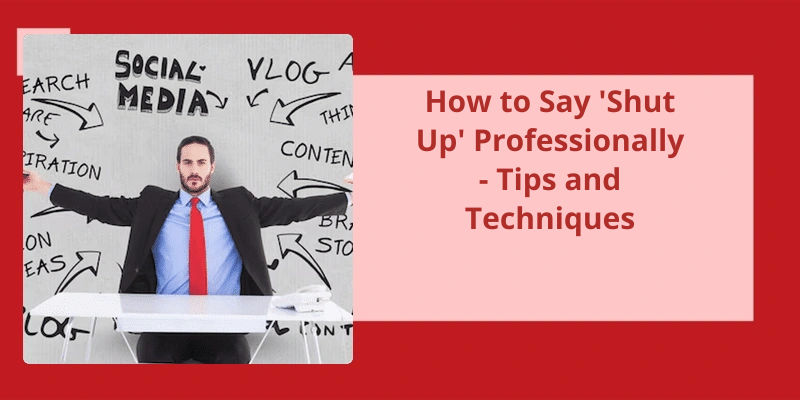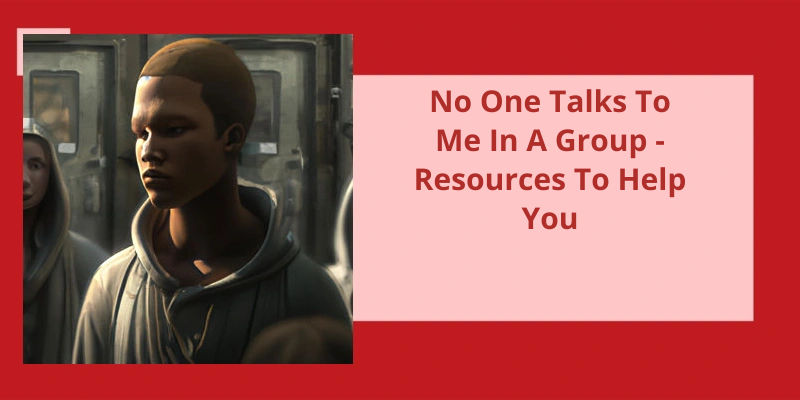In professional settings, it's important to know how to communicate assertively without resorting to rude or vulgar language. One commonly used phrase that can easily be misinterpreted as impolite is "shut up." While it may be appropriate in certain contexts among close friends or family members, using it in a business or formal setting can come across as disrespectful and unprofessional. Luckily, there are several alternative phrases that convey the same message while maintaining a more appropriate tone. Some of these include "be quiet," "fall silent," "gag," "hold one's tongue," "hush," and "silence." In this article, we'll explore these options in more detail and provide examples of how to use them effectively in different situations.
What Does Shut Up Mean in Slang?
In slang language, shut up is often used as a colloquial expression to signal that the speaker wants the other person to stop talking immediately. This phrase can be considered rude and impolite, especially if used in an aggressive tone. It’s essential to understand that telling someone to shut up can be perceived as an insult, and it may lead to arguments or misunderstandings.
The implications of using the phrase “shut up” can vary depending on the context, relationship, and cultural background of the parties involved. However, in more formal settings, such as business meetings or public events, using shut up may be seen as unacceptable and inappropriate.
Therefore, it’s essential to be aware of the nuances and consequences of using certain expressions and to choose words carefully to avoid misunderstandings or hurtful statements.
For instance, instead of telling someone to shut up, one can say “please be quiet,” “I need some silence,” or “lets talk about something else.”. These alternatives can help maintain a positive conversation while avoiding the negative connotations of shut up.
Therefore, it’s advisable to use alternative expressions or to avoid using shut up altogether to ensure effective communication and respectful behavior.
Different Phrases and Expressions Used to Tell Someone to Be Quiet or Stop Talking
This article will discuss various common phrases and expressions used to request someone to refrain from talking or to be quiet.
In this article, we will explore the reasons why telling someone to shut up is considered rude and explore alternative ways to communication that are more respectful and considerate. Let’s delve deeper into this topic and look at some constructive ways to communicate with others.
Why Is It Rude to Tell Someone to Shut Up?
I need a moment to collect my thoughts. Could we take a break from talking for a bit? or Could you hold off for a second while I finish what I’m saying? These phrases make it clear that you want the person to stop talking, but in a way that isn’t rude or aggressive.
Additionally, telling someone to shut up is dismissive and shows a lack of respect for their thoughts and feelings. It can be hurtful and make the person feel unheard or insignificant. Communication should always be based on mutual respect, and telling someone to shut up goes against that principle.
Sometimes, people use blunt language as a shortcut instead of taking the time to learn how to articulate their thoughts better. By learning how to communicate effectively, people can avoid unnecessary conflicts and improve their relationships.
Lastly, it’s essential to remember that everyone has the right to express themselves, and telling someone to shut up denies them that basic right. In a free and democratic society, everyone has the right to voice their opinions and engage in meaningful discussions. By telling someone to shut up, you’re essentially trying to silence them, which isn’t a healthy or productive way to debate issues.
It can create tension, escalate the situation, and deny them the right to express themselves. It’s essential to approach communication with kindness, respect, and the intention to understand the other persons point of view. By doing so, we can build stronger relationships and resolve conflicts peacefully.
Despite it’s long history, the origins of the phrase “shut up” remain somewhat elusive. While it’s known to have been in use for centuries, no one individual or group can be credited with coining the term. Instead, it’s evolved over time to become the ubiquitous phrase we know today.
Who Created the Word Shut Up?
While it’s difficult to pinpoint the exact originator of the phrase “shut up,” it’s clear that it’s been in use for centuries. Some speculate that it arose from the practice of locking up prisoners in a cell and commanding them to remain silent. Others believe that it developed due to the need to keep noise levels down in crowded, urban areas.
French was spoken by the aristocracy in England during the sixteenth century, so it’s possible that the phrase made it’s way into the English language through this connection.
It’s often used in a casual, colloquial manner as a way of expressing annoyance or frustration with someone who’s talking too much or being too loud. However, it can also be employed in a more serious manner to demand silence in a situation where speaking would be inappropriate or dangerous.
In recent years, some have raised concerns about the use of “shut up” as a form of verbal aggression or bullying. While it’s true that the phrase can be used in a hurtful way, it’s important to note that it isn’t inherently offensive.
While we may never know for sure who first used it, we can be certain that it’s played an important role in the development of the English language.
The Evolution of the Phrase “Shut Up” Over Time and It’s Varying Meanings in Different Cultures
- According to historical records, the phrase “shut up” has been used since the 14th century in English language.
- Initially, the phrase was used to mean “stop talking” or “be quiet”.
- As time passed, the phrase became more commonly used in a negative context to insult or silence someone.
- In some cultures, the phrase is considered very disrespectful and shouldn’t be used in polite conversations or around elders.
- In other cultures, the phrase is used as a joke or in a friendly manner to tell someone to stop talking.
- The interpretation and significance of the phrase “shut up” varies greatly across different social groups, context, and cultural norms.
Source: Where did the phrase ‘shut up’ come from?..
Dealing with someone who tells you to shut up can be frustrating and challenging. However, there are many ways to respond to such a situation that can diffuse tension and even turn the tables. We’ve gathered the 10 best comebacks for shut up, each with it’s own unique approach and tone. Whether you want to be humorous or assertive, there’s a comeback on this list for you. So, let’s dive in and explore some of the best ways to respond to the dreaded shut up.
What to Do if Someone Said Shut Up?
It can be both frustrating and hurtful when someone tells you to shut up. However, it’s important to respond appropriately to the situation in order to maintain your dignity and self-respect. Here are some useful comebacks that you can use the next time you find yourself in this situation:
First of all, it’s important to remain calm and collected when someone tells you to shut up. Remember that you’ve the right to express your opinion and ideas, and there’s no need to be silenced by anyone elses words. One effective comeback that you can use is to simply say “Talk to the paw, cause the tail don’t wanna hear it.”. This witty response is sure to catch the other person off-guard and make them think twice before speaking to you disrespectfully again.
Another great comeback is to calmly state “I’ll not be silenced.”. This simple statement asserts your confidence and self-worth, and sends a clear message that you won’t tolerate anyone trying to silence your voice. Alternatively, you can remind the other person of their own rights by saying “I know I’ve the right to remain silent.”
If the situation allows for a bit of humor, you can use the comeback “No one asked you, though.”. This witty response lets the other person know that their input isn’t necessary or wanted, and can be useful in diffusing tension and making light of the situation.
If you want to take a more assertive approach, you can try the comeback “Lead by example.”. This response challenges the other persons behavior and asks them to consider how they’d feel if they were in your shoes. Similarly, saying “Just cover your ears” indicates that the other person can choose to ignore you if they don’t like what you’re saying, without resorting to rude or disrespectful behavior.
If you suspect that the other person may be having a bad day or facing personal issues, you can use the comeback “Bad day?”. This response shows empathy and understanding, and can help to defuse the situation while also respecting the other persons feelings. Finally, saying “After you” can be a polite but firm way of indicating that you won’t be silenced and that you expect to be heard. These are some effective comebacks that you can use if someone ever tells you to shut up. Remember to stay calm, confident, and assertive, and never let anyone silence your voice.
The Psychology Behind Why Someone Might Say Shut Up and How to Understand Their Perspective
- The person may be feeling overwhelmed or stressed.
- They may feel like they aren’t being heard or understood.
- They could be experiencing frustration or anger.
- They may be trying to convey a sense of importance or control.
- It’s important to try and understand their perspective and address any underlying issues.
Knowing how to politely ask someone to be quiet or stop talking can be a valuable social skill. While it may seem rude to tell someone to “shut up,” there are numerous ways to convey the same message without being disrespectful. In this article, we’ll go over some common phrases and techniques for gently but firmly telling somebody to quiet down or stop talking.
How Do You Tell Someone to Shut Up in English?
When trying to convey the message of “shut up” to another person in English, there are a few different phrases you can use to do so without coming across as rude or aggressive. These phrases include “be quiet,” “hush,” “fall silent,” “hold your tongue,” and “just pipe down.”. Each of these phrases conveys the same idea of wanting the other person to stop talking or making noise, but in a more polite or subtle manner.
If youre in a more casual setting and are comfortable using slang, you might opt for phrases like “button it” or “put a sock in it.”. These phrases are more brash than the previous examples, but can be appropriate in certain situations. For example, if someone is being particularly loud and obnoxious, you might say “put a sock in it” to get them to quiet down.
Finally, there’s the phrase “keep your trap shut,” which is a more aggressive way of telling someone to be quiet. This phrase isn’t recommended for use in most situations, as it can come across as confrontational and rude. However, in certain circumstances, like when someone is being intentionally difficult or disrespectful, it might be appropriate.
Overall, the way you tell someone to be quiet or to stop talking in English will depend on the situation and your relationship with the person. It’s important to choose a phrase that conveys your message clearly while also maintaining a level of respect and professionalism, if necessary. By using one of the phrases suggested here, you can effectively communicate your desire for quiet without causing undue tension or offense.
Nonverbal Ways to Convey the Message of “Shut Up”
Nonverbal ways to communicate the message of “shut up” include using hand gestures such as placing a finger to your lips and making a shushing motion or using facial expressions like raised eyebrows and a stern look. These nonverbal cues can be effective in conveying your message without directly saying the words and risking offending someone.
The term “shut up” has a long history, dating back to the 1400s when it meant to secure something away. As time progressed, the meaning of shut up evolved to include confining someone, closing a door or window, or bringing something to a conclusion. However, in modern times, “shut the fuck up” has become an expletive form of the phrase, with various uses and references in pop culture and the internet.
What Is the Origin of the Term Shut Up?
The term “shut up” has a long and complex history. It’s origins can be traced back to the 1400s, where it was used as a verb phrase to mean “to secure something away in a receptacle.”. Over time, however, the term evolved to take on a multitude of different meanings and uses.
By the 1500s, shut up had begun to take on new meanings, such as “confine someone,” “close a door or window,” or “bring to a conclusion.”. These different meanings of the term would go on to influence the way that the expression was used in the centuries that followed.
For example, the phrase has been used as the title of a song by Basshunter, and was also used as the name of a tour by Bruce Springsteen.
Conclusion
In conclusion, it’s important to understand that language and communication are crucial components of professional relationships and interactions. It’s never appropriate to use hurtful or offensive language. When it comes to expressing the desire for someone to stop speaking, there are many polite and professional ways to accomplish this. The synonyms for "shut up" in American English, such as "be quiet," "fall silent," "gag," "hold one's tongue," "hush," and "silence" should be used in a respectful manner. By choosing to communicate effectively and respectfully, we can foster a positive and productive environment in all aspects of life.






